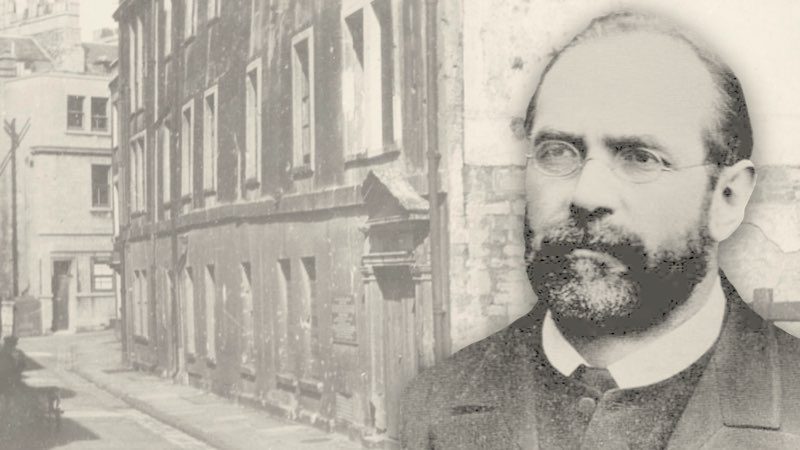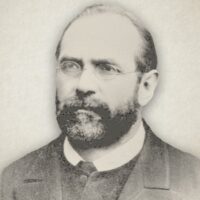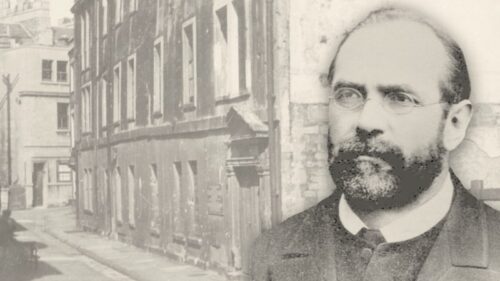
The Christian’s Life And The Christian’s Death
Gospel Magazine 1902:
[Notes Of A Funeral Sermon, Preached By Edward Carr At Providence Chapel, Bath, April 6th, 1902, On The Death Of Mr. F. Farvis, For Many Years A Faithful Ministry Of Jesus Christ, And A Frequent Contributor To The “Gospel Magazine”.]
“For to me to live is Christ, and to die is gain.”—Philippians 1:21
How vast is the difference between the man who is a Christian and the man who is not a Christian! For to the Christian to live is Christ, and for him to die is gain. On the contrary, the man who is not a Christian lives to self and the world—whatever may be his profession; and for him to die in that state is loss of all his hopes, the loss of all his happiness, the loss of all his possessions, and the loss of his immortal soul; and, “What shall it profit a man, if he shall gain the whole world, and lose his own soul? Or what shall a man give in exchange for his soul?” (Mark 8:36, 37). May the Lord seal home this solemn truth upon some hearts hitherto careless about eternal things! Now, our departed friend, Mr. Farvis, was a true Christian, and the words of our text had a special application to him. He could indeed say, “For to me to live is Christ, and to die is gain.” I purpose, by the Lord’s help, to speak to you very simply this evening, in the first place, of the Christian’s Life—“For to me to live is Christ”; and, in the second place, of the Christian’s Death—”To die is gain.”
1. The Christian’s Life: The beginning of it is in the Regeneration of the soul by the Spirit, Conviction of Sin by the Law, and Conversion to the Lord Jesus Christ by the Gospel, which is made the power of God unto salvation. Mr. Favris’s testimony both by tongue and pen consisted, to a very large extent, in maintaining the necessity of the experience of these three fundamental operations of the Holy Ghost, by which divine life is communicated and the soul “born again.”
The life thus begun is a life of Fellowship with the Lord Jesus Christ, and so our friend found it to the end. His conversation, especially of late, was much about Jesus. I recollect when walking with him, he fell into a kind of soliloquy, as his manner sometimes was, and, talking half to himself and half to me, he said: “Yes, Jesus is a Friend you cannot mend. He is a Friend without end; a Friend who will always tend us; and a Friend who will ever lend us whatever we need to get through this life. Jesus is a Friend who will defend us; and a Friend who will attend to our cry.”
This experience of the communicated grace of the Lord Jesus, and of what He is to His people is true fellowship. For such an one to live is Christ. Again, the Christian’s life is a life of dependence upon Christ. Now, dependence is an act of faith by which the soul leans upon the Lord Jesus in its weakness, and looks to Him for the supply of every need. The Apostle describes it thus: “The life which I now live in the flesh, I live by the faith of the Son of God” (Gal. 2:20), and this applies to temporals as well as spirituals. The Lord honours the faith which He gives, notwithstanding all the, faults and infirmities of the believer, and even though the little faith is often obscured by the clouds and mists of unbelief, the truth remains: “He that believeth”—trusteth, clingeth, looketh unto Jesus—“shall be saved.”
The Christian’s life is also a life of Tribulation. Mr. Farvis found it so all through. Besides the troubles common to Christians, generally, he had no small share of those peculiarly distressing trials which often fall to the lot of ministers. Seas of sorrow were waded through in his pastorates. Of late years he suffered much from almost incessant pain and affliction of body. The daily cross was very heavy, but one could clearly see that it was sanctified, and made the means by which he was ripened for glory.
Then our friend lived a life of diligent toil in the Master’s service. Both tongue and pen were busily employed for a long course of years. I wonder how many sermons he preached, and in how many different places! His texts were often very peculiar, and his preaching was marked by great originality. His writings were published in the Gospel Magazine, and in the sixties and seventies appeared frequently over the signature “F. F., Tetbury.” But I think the little “Friendly Companion,” edited by his life-long friend, Mr. Jefferies, was the channel by which he communicated most of his thoughts to the public. His writings are pithy, pointed, peculiar in style, and marked by a certain sagacious wisdom; though they vary much in merit. Those published some years ago under the title of “Tetbury Tracts” are excellent.
But, the servant of the Lord declares in our text: “For to me to live is Christ.” Our dear brother found it so. Christ was really to him “all and in all.” When faith lost sight of the Beloved, or the enjoyment of the Lord’s presence was withdrawn, he sometimes sank very low indeed in his soul’s feelings. Moreover, the experience of the fact, “For to me to live is Christ,” is invariably accompanied with a true sense of unworthiness, nothingness, and sinfulness. Very deep and very heart- felt were Mr. Farvis’s complaints of his wretched self. He knew by long and varied discipline that his life was in Christ, and not in self. The life of the branch is not in itself, for the moment it is severed from the vine it withers and dies. Its life is in the root, and is derived from thence by virtue of its vital union with the vine. Thus the Christian’s life is derived from Christ by continual communication. The inward, mysterious, perpetual, and wonderful growings of life divine from the root, Christ Jesus, to His branches is the principal secret of real religion. The man of God daily finds that Christ’s power defends him from every foe; that His wisdom ordains the path and directs his steps. Christ’s grace suffices to support under and to sanctify every trial. Christ’s hand is outstretched to uphold and lead him right, while it is opened to supply his needs. Christ’s blood cleanses him, Christ’s righteousness clothes him, and Christ’s love comforts him when the cup otherwise seems filled with gall. Not only is the godly man thus in Christ, but Christ is in him. Notwithstanding indwelling sin, all faults, failings, and shortcomings, still Christ’s Spirit dwells! in him, His Word and His grace—abide.
He desires to live to Christ, and in word and deed to glorify His name. He lives on Christ as the food of his soul, and daily seeking daily finds the heavenly manna under the dew; the portion of a day in his day. Enough for the day, but none to spare. Such is the Christian’s life. We now must notice—
2. The Christian’s Death. Our dear friend had a very comfortable death. Sitting after tea usual in his chair, and being a little poorly, his dear wife—his companion for very many years—gave him his medicine, on which he said he felt better; and, then looking at her quite cheerfully, he simply said, “The Lord is come,” and departed then and there to be with Jesus. Death was the door into heaven. Gently it opened and let him in, without a struggle, groan, or sigh. Ah! yes! for him to die was gain indeed! He gained what he had long sought for—the happiness of being with Christ and like Christ. The weary labourer gained his rest, the storm-tossed mariner entered the peaceful haven.
“Then are they glad because at
And quiet now they be:
So to the haven He them brings
Which they desired to see.”
That rest in eternal glory, in the paradise of God, more than compensates for all the strife and toil of his mortal life. Sweet, too, is the rest of the poor worn-out body in its narrow bed during the remainder of the night, “until the day break, and the shadows flee away!” That wondrous sound, never before heard, will soon awaken the dead in Christ—the peal of the resurrection trumpet. Soon will the Son of God appear in the clouds of heaven. Soon will the graves be opened and that which is sown in corruption shall be raised in incorruption: that which is sown in dishonour shall be raised in glory. “Then shall be brought to pass the saying that is written; Death is swallowed up in victory” (1 Cor. 15:54). As has been well said respecting another aged servant of God, who passed away about the same time, Mr. Farvis’s was “an honoured life, a peaceful end, and heaven to crown it all.”
May this portion likewise be ours, dear friends.
Edward Carr (1851-1920) was a Strict and Particular Baptist Preacher. He grew up under the gospel ministry of James Wells, his father serving as a deacon of the church meeting at Surrey Tabernacle, Borough Road. His first two pastorates were with the churches meeting at Sleaford and Leicester. His last pastorate was with the church meeting at Providence Chapel, Bath, a position he held for twenty-seven years (1893-1920).




